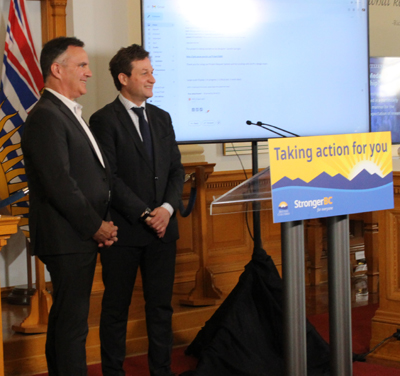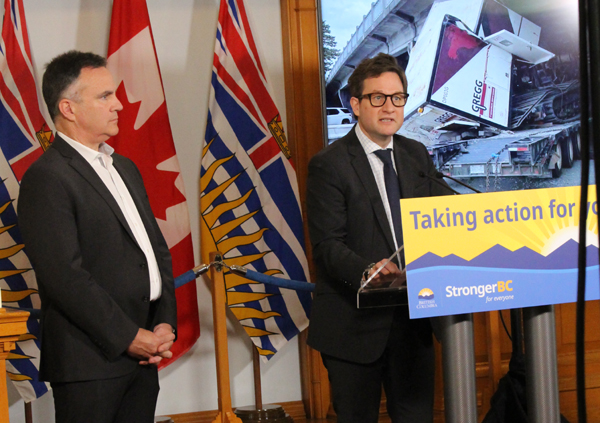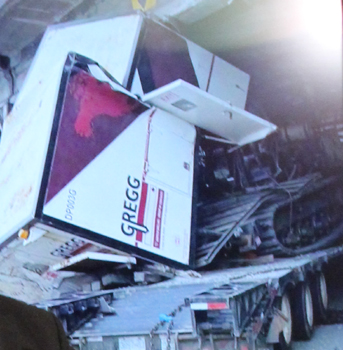Tuesday March 12, 2024 | VICTORIA, BC [Updated 8:27 pm]
by Mary P Brooke | Island Social Trends
Changes intended to reduce crashes involving commercial vehicles and infrastructure were announced today by Minister of Transportation and Infrastructure (MOTI) Rob Fleming.
He was accompanied at the media session in the Hall of Honour at the BC Legislature at noon today by Dave Earle, president and CEO, BC Trucking Association.

If the new legislation goes through, drivers of commercial trucks involved in infrastructure crashes will face higher penalties. Fines of up to $100,000 could be imposed as well as imprisonment for up to 18 months upon conviction for violations. That’s dramatically higher than the $500 fine level that is currently in place.
Fleming noted that in a court room there could be a need to press these hard fines and jail time if there has been injury or death as a result of a negligent crash into infrastructure.
The new fines and penalties could be in effect as soon as April or May.
Safety and economic savings:
This is part of the NDP government taking stronger action to make highway travel safer for everyone.
Fleming also emphasized that the truck/infrastructure mishaps can cause millions of dollars in economic impact between the delays for other nearby trucks on the road and the costs to repair the damaged infrastructure, not to mention the significant impositions that traffic delays cause for other motorists and their spheres (families, workplaces, etc) including supply chain disruptions.
Fleming emphasized today that the number of commercial truck drivers contributing to these impacts into infrastructure (like bridges and overpasses) is very small. But the extent of the damage caused can be significant.
“With these new penalties, we are taking the strongest action possible to keep our roads safe and to keep people, goods and services moving,” said Fleming.
Drivers and trucking companies:
“This also sends a message to commercial truck drivers that they are responsible for the safe transportation of goods and services on our roads, and a lax attitude toward safety will not be tolerated,” said Fleming.

“These crashes need to stop,” said Fleming, referring to 35 crashes that have occurred since late 2021 by over-height commercial vehicles.
Technology can help. Vehicles can be equipped with a warning that the dump-box is raised (in an upright position it will smash into overhead structures). Other jurisdictions have visual advisories of the height of overpasses, which are intended to warn commercial truck drivers.
The new level of fines and potential imprisonment are very focused on the behaviour of drivers. Trucking companies also have a role to play in responsibility for safe driving including driver training and drivers learning to assess load size and weight.
“There are all kinds of checks and balances in the trucking industry that should be practiced,” said Fleming as to the responsibility of drivers and trucking company operators. “Dispatch needs to make sure the driver has the load measurements.”
“The customer has a role, the driver has a role, and the carrier has a role,” said Fleming, as to assuring load measurement accuracy.
Toughest in Canada:
MOTI says that the proposed maximum penalty for commercial transport violations is far above those of other Canadian provinces and territories and falls in line with maximum penalties applied to rail and dangerous-goods safety.
The BC Trucking Association has been consulted and supports the proposed increase in maximum penalties.
Support from BC Trucking Association:
“The BC Trucking Association welcomes the legislative change by the Province to hold carriers accountable,” said Earle. “Imposing stricter penalties for carriers supports road safety and helps protect infrastructure, and ultimately enhances safety for everyone on our roads,” he said.
To support the commercial transport industry through this change, MOTI is developing training material that provides commercial drivers guidance on the proper measurement of vehicle/load height in a component of the Mandatory Entry Level Training (MELT) program for Class 1 drivers.
Training:
in BC there is Mandatory Entry Level Training (MELT) for commercial big-truck drivers, requiring at least 140 hours instruction. That MELT training became mandatory on October 18, 2021.
Today Fleming said that represents the highest level of training in the country now.
However, he also mentioned that a truck driver safety awareness campaign is underway by the Province, to help reinforce good standards for commercial vehicle driver performance.
Fleming wants to see “confident skilled drivers” in BC, noting that BC has a great variety of topography challenges including high mountain passes and roads that are winding.

===== RELATED:
- Minister’s statement on suspension of safety certificate following collision (December 28, 2023 / BC Government)
- Commercial vehicle drivers must use electronic logging devices (February 13, 2023)
- Dec 27 update: Xmas Eve bus crash in BC Interior (December 27, 2022)
- Combo professional truck driver training and highway safety (November 14, 2022)
- Transportation insights from Minister Fleming to business community (March 2, 2021)








